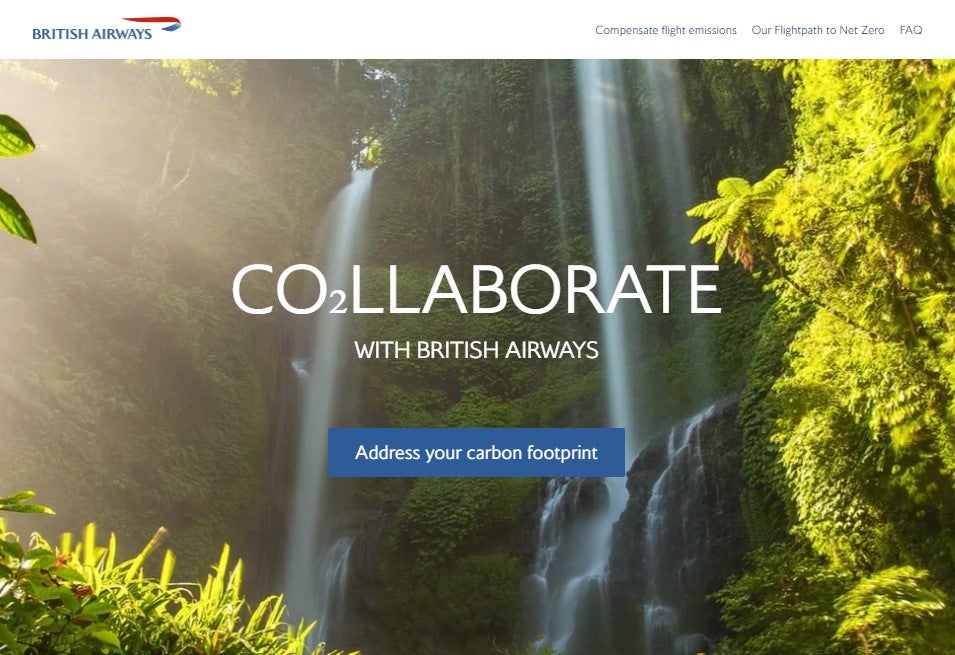British Airways adds ‘carbon offsetting tool’ to website
Carbon calculator allows passengers to ‘pay’ to offset their carbon footprint with Sustainable Aviation Fuel

Your support helps us to tell the story
From reproductive rights to climate change to Big Tech, The Independent is on the ground when the story is developing. Whether it's investigating the financials of Elon Musk's pro-Trump PAC or producing our latest documentary, 'The A Word', which shines a light on the American women fighting for reproductive rights, we know how important it is to parse out the facts from the messaging.
At such a critical moment in US history, we need reporters on the ground. Your donation allows us to keep sending journalists to speak to both sides of the story.
The Independent is trusted by Americans across the entire political spectrum. And unlike many other quality news outlets, we choose not to lock Americans out of our reporting and analysis with paywalls. We believe quality journalism should be available to everyone, paid for by those who can afford it.
Your support makes all the difference.British Airways is making it easier for its customers to carbon-offset their flights with a new online tool.
The “CO2llaborate” microsite has been developed with the climate technology company CHOOOSE, and features a tool also used by the airline Iberia.
Customers can use a carbon calculator to work out a more precise emissions “cost” of their flight to the environment, and purchase as much or as little sustainable aviation fuel (SAF) as they like to offset the damage.
A statement by the airline describes CO2llaborate as “an evolution… featuring more precise emissions calculations and a new adjustable slider to give customers more control over the amount of SAF versus verified carbon offsets they wish to purchase.”
Using the tool to calculate a return journey from London to Marrakech (2,339 km in distance), The Independent was given an estimation of 372.37kg of CO2e as the amount per person of carbon emitted.
Selecting “offset 100 per cent” of the emissions, using a slider tool, tallied up a fee of £71.54 towards SAF, with BA advising above the tool that “most people offset 10 per cent” of flight emissions (costing £11.96).
According to British Airways, “Sustainable aviation fuel (SAF) is an alternative to fossil-based conventional jet fuel that has significantly lower life-cycle carbon emissions”.
“SAF is designed to meet the same strict quality standards as conventional jet fuel so that it can simply be mixed into existing aircraft and fuel infrastructure... When the lifecycle emissions of SAF are calculated, they result in around 80-95 per cent less CO2 emissions compared to conventional jet fuel,” says the airline on its microsite, ba.chooose.today.
Globally, the aviation industry accounts for around 2.5 per cent of all carbon emissions, meaning airlines are racing to prove that they can make flying more sustainable and lower impact on the climate.
Earlier this year, research by the journal Environmental Research Letters found that aeroplanes emit around 100 times more CO2 per hour than a shared bus or train ride. Researchers found that global aviation generates around 1 billion tons of CO2 per year — more than the annual emissions of most countries.
Traditionally, airlines have used offsetting schemes such as forestry projects to ease consumer consciences when it comes to frequent flying.
However, in 2021 an investigation carried out by the Guardian and Unearthed, Greenpeace’s investigative arm, found that forest protection schemes routinely used by airlines to “offset” climate-warming emissions were “not robust enough”.
The Independent’s head of travel, Helen Coffey, who has been flight-free since 2020, says: “While carbon offsetting is a tool that can be used to help us reach net zero by 2050, it can also be hugely problematic - especially when it comes to flying.
“Funding SAF production, which most airlines have already committed to using more of as part of their climate targets, is questionable as these fuels emit as much carbon inflight as regular kerosene and have the same additional warming effects when burned at altitude.
“In addition, suggesting customers offset just 10 per cent of their flight emissions is underwhelming, to say the least. If you’re going to offset properly, you need to use a robust air travel emissions calculator, such as Atmosfair, that also includes the warming impact of the other chemicals released inflight; choose a certified offsetting scheme you trust; and pay to offset the total emissions of your flight.”
Join our commenting forum
Join thought-provoking conversations, follow other Independent readers and see their replies
Comments